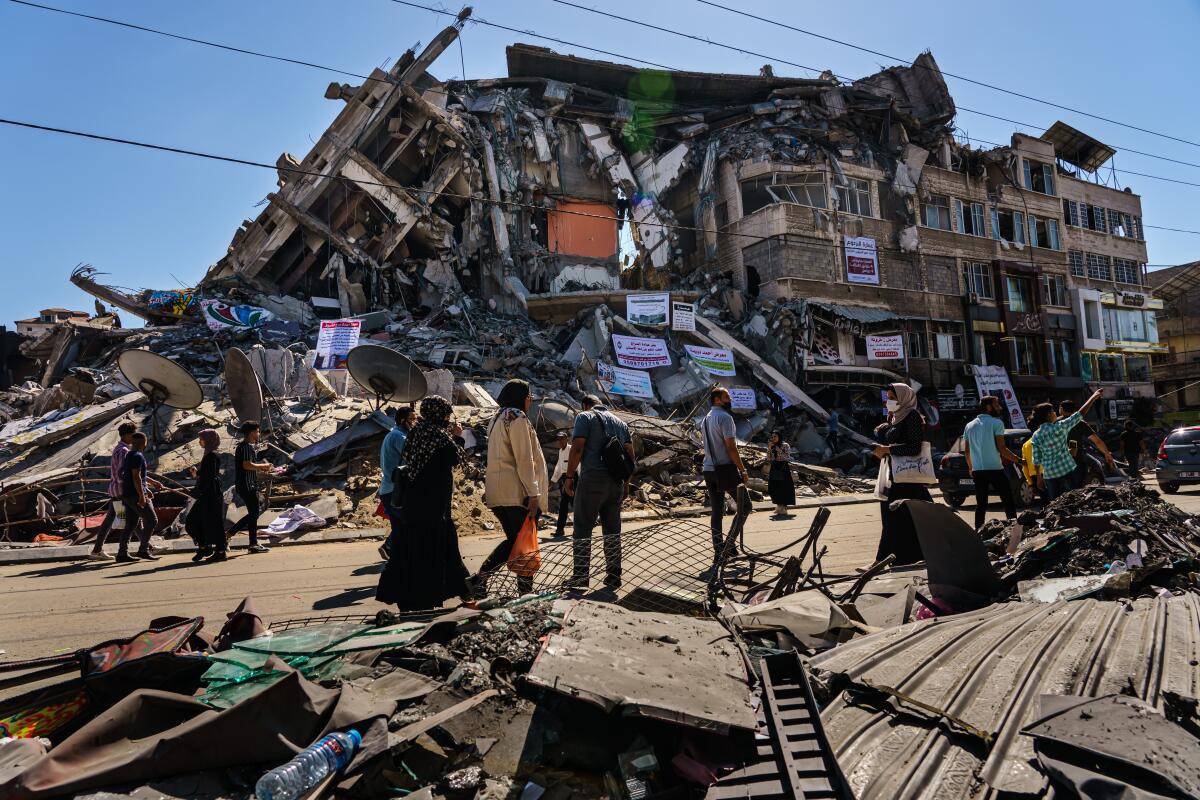Defend Israeli and Palestinian human rights workers

- Share via
Just days after Israel’s post-Netanyahu government was formed, the International Criminal Court swore in its new prosecutor, Karim Asad Ahmad Khan, who will take up the process begun by his predecessor to investigate both Hamas and Israel for war crimes. These investigations may include the most recent war in Israel and Gaza.
Essential to former Israeli Prime Minister Benjamin Netanyahu’s legacy is his relentless campaign against Israeli and international human rights defenders. Now, the immediate postwar period and the context of international scrutiny make this a particularly important and precarious time for Israel’s human rights sector. And while Israel’s new Bennett-Lapid government has an opportunity to take a different path, Netanyahu has bequeathed the blueprint for a catastrophic government backlash to the ICC’s investigation — one that could target Israel’s human rights defenders.
President Biden and Secretary of State Antony J. Blinken have said that they would bring human rights to the forefront of their foreign policy. This is good news. But a human-rights-first approach should apply to our allies as well as our adversaries. As someone who runs an organization that invests millions in Israeli civil society each year, I’ve seen threats to the safety of Israel’s human rights sector before.
In 2010, just a few months after I started my job as chief executive of the New Israel Fund, a group of ultra-right-wing Israelis aligned with Netanyahu’s administration launched a vicious public attack on human rights supporters and organizations. My organization, which supports human rights work, was made a central target of the attack. The United Nations had just published the Goldstone Report, which investigated alleged Israeli and Hamas human rights violations during the 2008-2009 war in and around Gaza. The reporting and data gathered by several human rights groups we supported were cited in the report — the same organizations cited widely by the Israeli military in its own investigations and by Israeli media.
Of course, this is the job of human rights organizations: to report and hold a mirror up to their own societies so that those societies can change for the better. But the strategy of the ultra-nationalist right was clear: Demonize all those who stand up for the human rights of Palestinians, and manufacture conspiracy to delegitimize them.
Politicians on the Israeli right were quick to pick up this strategy and translate it into legislation. In 2011, Knesset members proposed laws that would subject human rights organizations to official parliamentary panels of inquiry, and another bill that would strip them of tax-exempt status.
Those measures failed, but many others succeeded. That year, the Knesset enacted the “Nakba Law,” which allows the Israeli government to revoke funding from any cultural institution that commemorates the Nakba, or “catastrophe,” of Palestinian dispossession and exile in 1948; passed a law allowing lawsuits against people who support boycotts of Israel or its settlements; and imposed new reporting requirements on all nongovernmental organizations that receive funding from foreign governments — including international funds designated for human rights work.
Then, sometimes quietly, sometimes less so, the American administration stepped in. In 2011, then-Secretary of State Hillary Clinton told a closed session at the Saban Forum in Washington that Israel should not pass laws aimed at drying up the funds of peace and human rights organizations, because that is something democracies don’t do. Officials in the Obama administration made it clear that the U.S. would disapprove of attempts to pass such legislation. This defense buoyed Israel’s beleaguered human rights community and reminded Israeli lawmakers that Israel’s most important friend and ally was watching.
This didn’t completely solve the problem. Over the last 12 years, successive right-wing governments have passed additional legislation intended to curb the truth-seeking activities of organizations defending Palestinians’ human rights. But the Obama administration set an important example of what strong American diplomacy can accomplish.
After those interventions, some of the more egregious legislation was shelved, and though some of those proposals have become law in the years since, human rights organizations are still able to carry out their essential work. The Obama administration helped defend the legitimacy of human rights organizations in Israel, and therefore Israeli democracy itself.
With the ICC investigation looming, this is a critical moment for Israel’s human rights organizations. The new Israeli government has a choice to make. It may be tempted to follow in Netanyahu’s footsteps when it comes to human rights defenders, agreeing to the ultra-right camp’s proposals to delegitimize and ultimately render Israel’s human rights organizations illegal. But this government — made up of parties from the right, left and center — includes among its ministers and coalition members some of the country’s staunchest human rights defenders. They’ll need support from the international community to protect the human rights sector.
If the Biden administration is serious about its commitment to a human-rights-first foreign policy, then speaking up to protect Israeli and Palestinian human rights defenders should be part of that agenda.
Daniel Sokatch is chief executive of the New Israel Fund and author of the forthcoming book “Can We Talk About Israel?: A Guide for the Curious, Confused and Conflicted.”
More to Read
A cure for the common opinion
Get thought-provoking perspectives with our weekly newsletter.
You may occasionally receive promotional content from the Los Angeles Times.









